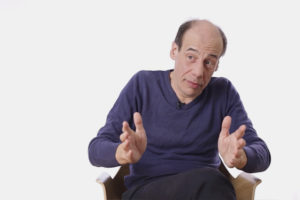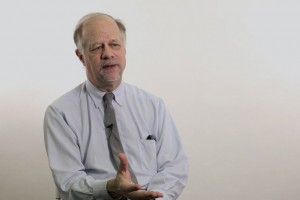End of Knowledge
Philosopher and sociologist of science Steve Fuller on the difference between ontology and epistemology, trans...
For the last couple of years here, in Tumen, I’ve been studying as a part of a research team ‘Material relations’. One of our thesis was that we need to rethink love as a mode of relation between humans and nonhumans. A part of this process was coming to our own philosophy of love.
One of my roles in this process was thinking about a long history of love which made me realise looking at love across a long expansive time just how narrow contemporary views of love are. I feel that there’s a tendency to see love today as a contract between individuals, that it is something secure, that you’re finding a completion of yourself in someone else, that you are enhancing one another when you’re in love and that love should basically be something which is pleasure, it causes pleasure, it fulfils you in a pleasurable way. I feel that this is narrow for reasons that I think we can explain by looking at a long history of love going back particularly to the Middle Ages and to ancient Rome.
I’ve been exploring how love can be painful and how painful love and destructive love, love that destroys the self can be the most productive kind of love. Perhaps it’s the very kind of love that we want to emphasize more as a mode of relation in the modern world. It sounds strange but I think it’s borne out through history.
We know about relations between love and pain, it’s in our language: you feel lovesickness, feel an agony of love, you’re heartbroken and things like that. Modern science has increasingly suggested that this relationship between love and pain is actually there, in the brain. Apparently, the same part of the brain is involved in processes of love and pain. Clinical psychologists talk about people coming to them with deep anxieties about love, and this is a condition which causes great pain in individuals. There’s a process called ‘stress cardiomyopathy’ which is a kind of illness that people suffer when they are deeply in love with physical manifestations that extremely painful. So scientists draw attention to this connection.
If we look back through Western history it’s interesting how this connection between love and pain has played out differently in different contexts. A classic example is Cupid and his arrow: in ancient Roman mythology Cupid fires arrows at people and this wound that Cupid causes generates the love, or it’s the mark of the love, or it stimulates or triggers love. Love is experienced as a wound. Ovid in his ‘Metamorphoses’ writes about Venus falling in love with Adonis. Venus has accidentally scratched with the arrow of Cupid, and this wound eats her alive. She falls so far in love with Adonis that it’s destructive to her: she tears off her clothes, she goes into the forest and she lives with Adonis, she becomes a hunter. She strips away, in other words, her former god-like humanity, she becomes lower. It’s a process of removing her person, of stripping away her being and becoming something more primal. Of course, it’s extremely painful: she describes it like she’s been eaten up.
In Western discourse since the Enlightenment or around that time there’s this idea that there are two types of love and the only one of them was painful. There’s erotic love, carnal love, lust which is somehow lower, and there’s a higher love, a transcendental love, a true love. For thinkers like Goethe, the German writer, it’s only the carnal love that could be really painful. Goethe says that the true skill in love is to discern between that which is the lower love and the higher love that you should truly follow. He says that the lower love is poison, it eats you alive if you fall prey to a carnal, destructive love. He said that you should follow this transcendent love which generates the true human being or a fulfilled human being.
The Middle Ages is an interesting case study where this boundary between higher and lower love is completely blurred. In fact, it’s in the Western Middle Ages, particularly in 1100-1200s, where this concept of love is born that love is something that addresses a lack within the self. And it’s in the Middle Ages that we have an idea that painful love is the most valuable, the most productive kind of love is that destroys you and also that self-annihilation itself which love is involved in, the self-annihilation of love, is that which can take you to God, can fulfil you to the highest levels precisely through the destruction of the self. An example of self-annihilation in love is Bernard of Clairvaux who’s the Cistercian monk from the 12th century, enormously important in the philosophy of love, very influential. He’s a monk who lives in a lonesome world, he lives in the community of monks, so total chastity, very simplistic living: the meditation on the Scripture and everything. Bernard writes all these sermons on love and he writes an awful lot of work that will be translated later into love poetry and circulate as a kind of method of how to love which becomes really popular when moves out of the monastery out to the world.
For Bernard of Clairvaux is important this erotic, lower kind of love which is not superseded: we don’t throw that away look for the transcendent love. For Bernard instead precisely this erotic, painful kind of carnal love needs to be procreated and turned into a transcendent love. What do I mean? There’s this fascinating moment in Bernard’s early life: he’s not sure what he’s gonna do with his life, he doesn’t want to be a knight or an aristocratic figure of power. Bernard wants to do something more productive in his life, he’s not sure; it might be spiritual, might not. And he sees a beautiful woman across a lake, he feels this carnal urge inside him, this stirring, the feelings of love, or lust, or whatever. Bernard responses to throw himself into the lake. Cold water, cold shower freed him from these feelings. He then decides that this is such a powerful force, it’s terrifying to him. He becomes a monk, and when he’s a monk this powerful force of erotic feeling of love, of lust was turned into this very powerful philosophy of loving God in his ‘De diligendo Dei’ – ‘On Loving God’. Bernard writes about how all love ultimately flows into love for God – all love, as if love itself were like a spark, love itself were a force which needs to be channelled, redirected to the right place which is love for God. So even the erotic love, carnal love, lust, these kinds of lower desire they’re still somehow godly and they need to turn back to their proper place. So for Bernard it’s an extremely erotic view of love for God, he writes very sensuously about his love, it’s almost ecstatic, almost orgasmic – I hate that word but it’s an ecstatic kind of love, it’s very physical.
So for Bernard of Clairvaux obviously love is self-annihilation: the more you love God the less you love yourself, you turn away from your own desires, you melt with God’s desires. All love flows to God and it includes love for self as well as all the others. So love is self-annihilating for Bernard: ultimately you end up reduced, your soul is reduced, you flow into the Godhead, love takes you there, love takes you to the emptying of yourself and the realization of yourself in God.
Another important medieval tradition is the idea of excruciatingly painful love as being something productive. An example of this is Hadewijch of Brabant who’s a mystic poet from the Low Countries in the early 13th century. She writes also her love for God but she experiences it as something excruciating. She says she feels consumed by love, she says it’s so painful to her it feels like all her limbs have been broken off, it’s eating up inside. This is her experience of love and yet she describes it as the force which brings her that ecstatic joy, it’s the force that is driving her life as a mystic poet, as a devoted Christian.
A culmination of this idea is in mystics such as Meister Eckhart and Marguerite Porete in the early 14th century. Marguerite Porete writes about herself being so in love with God that she completely lost her identity, she becomes a simple soul: she’s no longer Marguerite, she is the soul. She writes, again, about being consumed by love in this way and it’s a painful experience because she feels identical to fire, she feels so in pain in her love for God that she feels like she’s being burnt up. The irony for Marguerite (or maybe not the irony but the completion of this) is that she was actually burned at the stake by the French royal authorities for heresy. This kind of love for God was so scandalous because it seemed to cut out all other relations in the world, it was so personal, so direct: she didn’t need a church, she didn’t need royal supervision, ecclesiastical supervision, intellectual supervision. It was just you and God: an extremely dangerous way of seeing your connection with Christianity.
I think we can see this painful, self-annihilating love throughout Western discourse, it’s not just the Middle Ages. Keats writes in his poems about that painful love that can let a true pleasure in: only through pain can you reach that kind of pleasure. I think you don’t see it so much in Western discourse at least today in a sense that you need to destroy yourself in order to find true love. Alain Badiou, the French philosopher, writes about it in a way that bridges these views that love is destructive and involves self-annihilation but it’s not completely consuming. He writes about the events of love where you truly come to recognize the view of another, the view of the one you fall in love with. You work towards that and you suspend your own point of view. Falling in love is a crisis of self-destruction in that sense that you realize that you’re not the limit of your Universe, that you need to be incorporate another. But for Badiou it’s not really about destruction, it’s almost about seeing together, binding together.
Why is this important today? Why it might have relevance in how we think about love today? I would argue that there’s a great tendency to see love as something that we should encounter as a pleasurable experience. I think people tend to see love as almost a contract between individuals: I can make an agreement with you, we’re in love and we make this contract together. The danger of that is that it doesn’t recognize the radical possibility of love, that love can show you something beyond yourself, that love can take you to a radical austerity, radical empathy and a radical humility that can allow you to get beyond solipsism. I feel that a concept of love as a pleasure, a contract allows us to stay intact solipsistically: I understand the world around me, I don’t need another to change my views, I don’t need to accommodate another, I need to simply work with another. Whereas I believe that the self annihilating view has the benefit of showing us humility that comes through loving another: I love you and that love is predicated on the fact that it may fail, that I might be stupid, that I need to learn something from you, that living together with you means sacrificing something of myself to build something or to move towards somewhere else. I think that we’ll be happier in love (if this is really about people being happier in love today) once we recognize that it inevitably comes with a lot of self-sacrifice of some part the self and a genuine accommodation of someone else’s point of view, of feelings and being in the world.
I also think that that can be a model for more ethical ways of being with other people in the world simply by recognizing that we are incomplete but that we also need to lose part of ourselves to accommodate others, that we need to sacrifice, genuinely sacrifice parts of ourselves to accommodate the worlds of others, that it’s not just about compromising: I want what I want, you want what you want and we’ll come to an agreement. It might help us to recognize that sometimes we truly need our own desires, even our own sense of self in order to accommodate something else, accommodate something positive that others have to give us.

Philosopher and sociologist of science Steve Fuller on the difference between ontology and epistemology, trans...

Historian Alexander Sidorov on the unique artifact of the Carolingian Renaissance — a mysterious statuette of ...

Economist Lawrence H. White on the period of the international gold standard, cryptocurrencies, and the Consti...